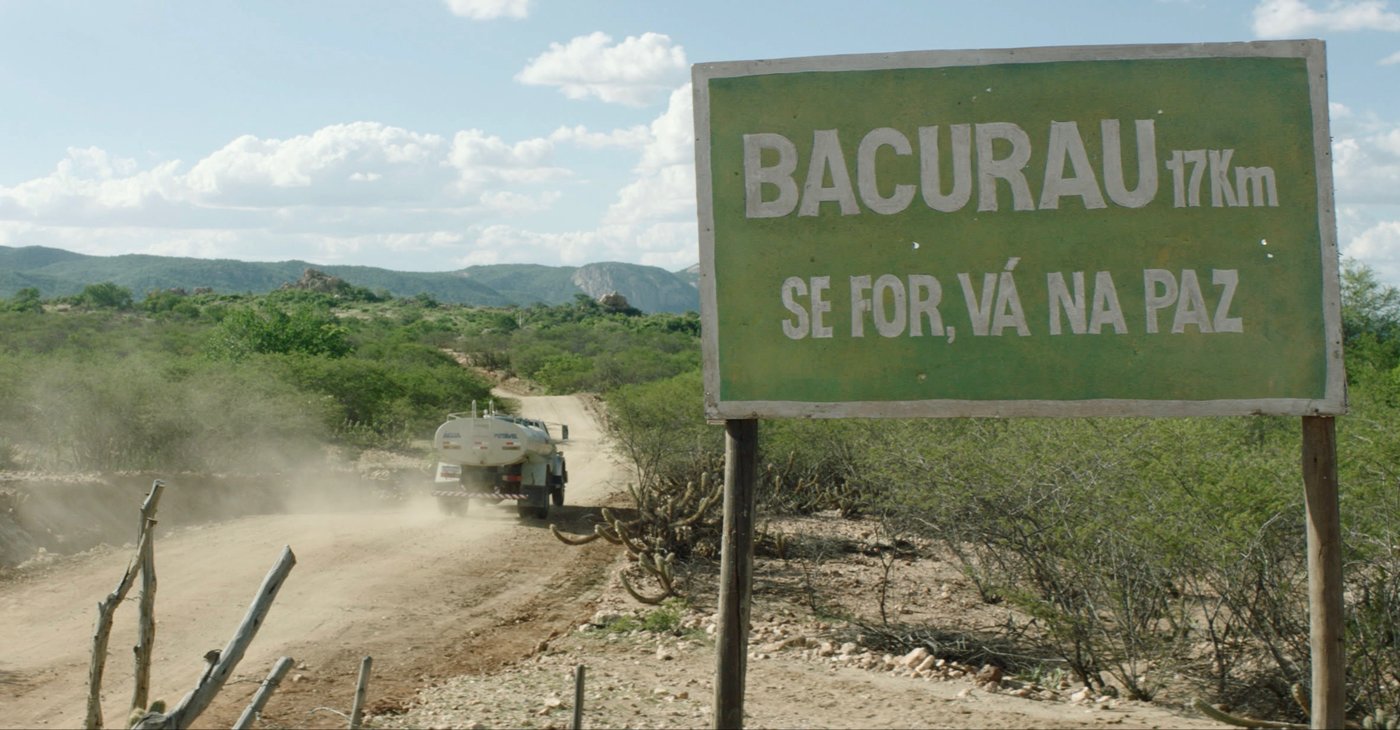
03 Mar The Proud Boys of Bacurau
BY DALI ADEKUNLE
Philadelphia Free Library cardholders can enjoy Bacurau for free on Kanopy. You can sign up online for a library card and create your Kanopy account.
Kleber Mendonça Filho and Juliano Dornelles’ Bacurau (2019) is an homage to and self-portrait of Afro-Indigenous Brazil. The opening funeral of a Black matriarch underscores the death of a community slowly being siphoned of its resources by political elites. The viewer assumes that Teresa’s (Bárbara Cohen) return to her rural northern-Brazilian town will be the film’s crux. As the film progresses, however, the viewer realizes that Bacurau is a narrative about the violence of the west and the anti-colonial resistance of a people who have no choice but to rebel. The film is a stunning political allegory of a “near-future” where technological surveillance, drone strikes, and pyrotechnic-led funerals are as commonplace as resource partitioning, political corruption, and military voyeurism. The gadgetry, high-speed wifi, and instantaneous connections that inform the digital lives of the rural townspeople do not safeguard them from the legacies of exploitation that persist. What is the utility of a high-definition hologram when your people don’t have access to drinking water?
Mendonça Filho couldn’t have predicted that the film’s caricatured American villains would be a prescient description of the United States mere months after Bacurau’s premier. Although the murderous group uses modern technology to locate their targets, their “hunting game” requires them to use muskets, rifles, and other outdated weapons. The Americans actively romanticize bloodshed by using relics of the past. Paired with ridiculous lines like, “I’m just ready to kill some locals!” and “You’re white, but not really white,” the audience witnesses an absurd cos-play of colonial and racial violence. For the American viewer, these scenes feel like uncomfortable cinematic stereotypes that are a mix of the theatrics of Michael Bay, the brutality of Quentin Tarantino, and the politics of George W. Bush. However, 2021 has solidified the fact that these caricatures are not as far off as we’d hoped. The film’s antagonists, much like the Trump-insurrectionists, seek an alternate reality that acquiesces to their white whims. On January 6, 2021, national protesters erected a makeshift gallow with a noose in Washington D.C.; they fashioned a guillotine on the Arizona State Capitol, and they burned effigies at the Oregon State Capitol. That day, the United States witnessed an absurd cos-play of relics from America’s past.

The viewer’s introduction to the gang of murderous Americans in the film is trite. The group’s ring leader and the “apex predator” of the film is a weathered German-American (Udo Kier) with questionable morals and incentives. They are a motley crew of military and weapon enthusiasts seeking to satiate their sadistic desires to kill poor Black and brown people. The scenes with the Americans resemble a live stream video game with an entire community in danger, and a parallel intra-national quarrel arises when one participant murders a young child in the village to the horror of his fellow patriot. Willy (Chris Doubek) has no reservations about executing adults, but the thought of the senseless killing of a child suddenly puts the former corrections officer in a position of moral superiority.
The geopolitical implications of this plot choice represent the long-standing relationship between the United States and Brazil. In 1964, the United States supported the coup d’etat of Brazilian president João Goulart under the Lyndon B. Johnson administration. The overthrow of the democratically elected leader ushered in a military dictatorship that lasted for twenty-one years. Brazilian citizens suffered through years of destabilization, food scarcity, and poverty, while the United States government maintained its innocent international facade. Indeed, the cronyism between Trump and Jair Bolsonaro, who grew to political power during Brazil’s dictatorship, is an apt legacy between American influence and increased militarism in Latin America.

Bacurau’s title reflects Brazil’s Indigenous core–as if the richness of the eponymous “nightjar” could only be encompassed within the Tupi-Guarani language. An hour into the film, the white southern-Brazilians are the ones to tell viewers that the town is named after the nocturnal hunting bird. With their saccharine charm and laissez-faire attitude, the couple from Rio de Janeiro stumbles into the town disguised as tourists. The Carioca couple attracts attention not only because they are white and they ride in on expensive dirt bikes but also because they are visibly uncomfortable with the irreverent joy and hospitality of the “nordestinos” (northern-Brazilians). In this dynamic, Mendonça Filho critiques intra-national assumptions of culture and class. Brazil’s north and northeast remain the poorest regions compared to Brazil’s southern cities and economic powerhouses like São Paulo, Rio de Janeiro, and Florianópolis. In contrast, 13% of people of primarily mixed Indigenous and Black ancestry who live in the capital city of Pernambuco (the northern-Brazilian state where the film takes place) live in extreme poverty. Paradoxically, northern Brazil is regarded as the cultural nexus of the country. Brazil’s African identity (Bahia), its rainforests (Manaus), and its forró musical influence (Ceará) all reside in northern Brazilian states.
Tragically, the southern-Brazilian interlopers are the first to pull the trigger against their own countrymen. They are not tourists but rather scouts for a group of American mercenaries contracted by Bacurau’s evil municipal mayor. Mendonça Filho depicts a barbaric ouroboros of a society cannibalizing itself while being cannibalized by western white supremacy. The alternative? Bacurau’s nearly utopic society that reveres its Black and Indigenous elders, celebrates its children, advocates for its citizens’ health, respects its sex workers, and embraces its queerness. The film’s prodigal child and savior is the trans freedom fighter Lunga (Silvero Pereira), who protects her community from drought and successfully fights off the group of suburban Americans dressed in tactical gear and polarized sunglasses. The town’s love for itself is antithetical to the Americans’ love of destruction.

American influences initially appear as a caricature but dissolve into portraiture once compared to contemporary footage of Trump’s America. The films are a mirror through which white Americans can view the brutal racism, queerphobia, and sport-like exploitation that informs our “liberty, justice, and equality for all.” The Americans in Bacurau and of Trump’s imagination are individuals whose distorted visions of ‘personal freedoms’ involve the dispossession of the rights of others. They hunt for space where white violence shields them from the knowledge that their lives are devoid of global community and ancestral purpose. Although American “patriots” are comfortable waving flags that warn “Don’t Tread on Me,” American patriotism is built on treading on the autonomy of Latin America, the Global South, and the rights of BIPOC. The Trump rally that initiated the insurrection looked more like an inaugural event at a Gun & Knife Expo than an actual defense of democracy. The sartorial choices for the Proud Boys, the Boogaloo Bois, Qanon, and a wide range of right-wing militias demonstrate the inextricable link between American conceptualizations of “sovereignty” and “hate.” These members don Viking horns, drape their bodies with bandoliers, and zip their camouflage red, white, and blue windbreakers because, from its inception, the U.S. American zeitgeist has been one of aggression. The white Americans in Bacurau are not the caricatures; rather, the white American understanding of liberty is a caricature of the values the nation was supposedly founded on. Freedom and violence are mutually exclusive, and it’s time for Americans to grapple with that reality.

Dali Adekunle is a cinephile and a health director in New York City. She was raised in a Spanish and Portuguese speaking household, and she loves to explore themes of cinematic depictions of labor, healthcare, and culture as it pertains to people of color.

Sorry, the comment form is closed at this time.